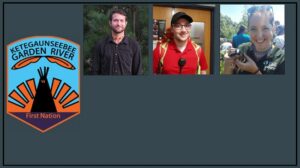Garden River First Nation cousins win $5,000 in Hack-a-thon competition

By Sam Laskaris
GARDEN RIVER FIRST NATION – Some recent late nights paid off for three members of Garden River First Nation.
Chris Seymour, Aaron Jones and Megan Young, who are all first cousins, took the top prize at the recent Hack-a-thon event, which was held in conjunction with the Indigenous Clean Energy E-Gathering.
The Hack-a-thon, which was open to teams of youth aged 18-30, consisted of an online competition. The event was hosted by representatives from Indigenous Clean Energy and SevenGen.
At the start of the five-day E-Gathering, those taking part in the Hack-a-thon were asked to come up with a presentation, maximum of 15 minutes long, by the end of the week.
Teams were asked to come up with a plan of how they would spend $500,000 over three years to encourage electric vehicle use in Indigenous communities.
Eight teams from across the country took up the challenge.
Seymour, who is a fourth-year aerospace engineering student at Carleton University in Ottawa, said he was rather surprised his team won the event.
For their efforts, the three cousins shared the winning prize of $5,000.
“When they announced the third- and second-place teams, I just assumed that we had finished fourth or fifth,” Seymour said. “It was a nice surprise when they said we had won.”
Ideally, Seymour would be in the nation’s capital now finishing off his university degree. But because of the COVID-19 pandemic, he is at his home in Sault Ste. Marie, taking online classes.
Seymour said it was Jones who came up with the idea to enter the Hack-a-thon.
Jones is a natural environment technologist, having graduating from Sault College. He’s also a graduate of the Westcoast Adventure College, located in Sooke, B.C.
Jones is currently living in Abbotsford, B.C. and is a junior researcher with The Firelight Group, which was founded in 2009 to support the rights and interests of Indigenous and local communities.
Young, a biology graduate from the University of British Columbia, is currently working as a wildlife biologist at the Toronto Zoo.
Seymour said that when his team was formulating its presentation it looked at why many people in Indigenous communities are hesitant to have electric vehicles and how to adapt to having electric vehicles in Indigenous northern Ontario communities that have some severe cold weather conditions. They also examined the anxiety some have about how far they can drive an electric vehicle before it requires charging.
The idea the trio came up with, if they had a $500,000 dollar budget, was to buy two 15-seat electric passenger vans that could transport Garden River First Nation members back and forth from nearby Sault Ste. Marie.
These vans would allow members of the First Nation that do not have their own cars to go into the city for necessities, including groceries.
With funds left over, the Garden River trio decided that money could be spent on installing car chargers in Indigenous communities along the north shores of Lake Huron.
Seymour said he did work rather hard on the proposed project along with his cousins.
“There were a couple of late nights,” he said.
Professionals in the Indigenous clean energy industry served as the judges for the Hack-a-thon.
“These judges were all expert industry professionals,” Seymour said. “If we were making anything up, they would know.”
Seymour said he would be keen to present Garden River First Nation elected officials with his team’s winning idea.
“I’d like to certainly present it to Chief and Council someday,” he said, adding the First Nation is currently in a lockdown with only members living in the community allowed in. “That will be something that will have to wait.”


